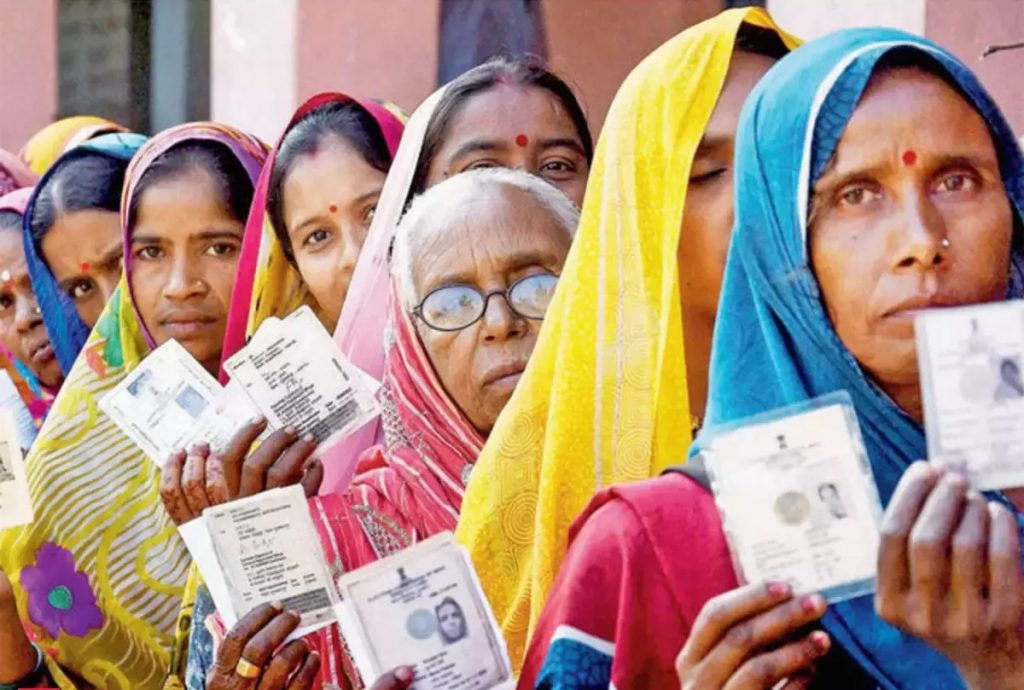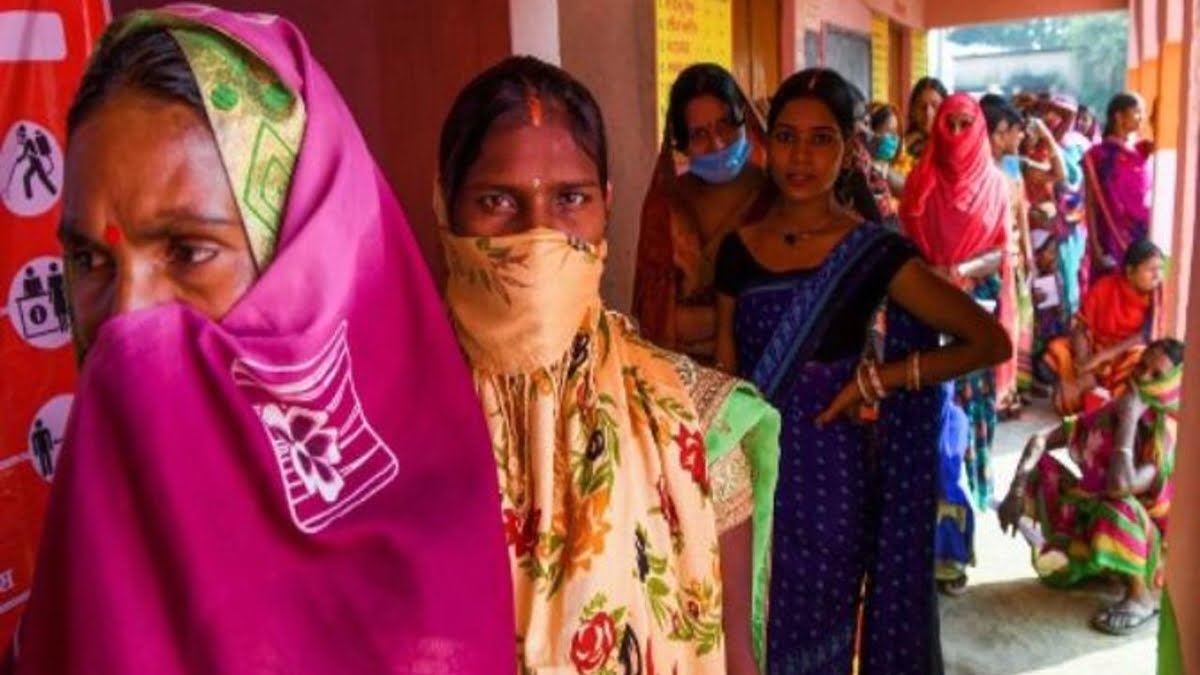Every result of elections in India reminds us of the abysmal representation of women in politics, Bihar being no exception to this. This is despite of the fact that women in Bihar have consistently outperformed men in terms of voting percentage in recent times. Both Prime Minister Modi and senior BJP leader from Bihar Sushil Kumar Modi in their speech after the results of recent Bihar elections claimed that the women votes in Bihar were an important factor in the NDA’s victory. This has also been confirmed in Lokniti-CSDS post-poll surveys, at least in the case of young women.
Both Prime Minister Modi and senior BJP leader from Bihar Sushil Kumar Modi in their speech after the results of recent Bihar elections claimed that the women votes in Bihar were an important factor in the NDA’s victory. This has also been confirmed in Lokniti-CSDS post-poll surveys, at least in the case of young women.
Notwithstanding this enthusiasm shown by the women of Bihar in voting and the gratitude shown by the winning party, the number of women candidates fielded by them were shamefully low. An estimation of women nominations across major parties in 2020 in Bihar State Assembly elections showed the following: RJD- 11.1%, INC-11.4%, Communist Parties-3.4%, BJP-11.8%, JDU-19.1% and LJP-16.3% (Lok Dhaba, TCPD). In 2015, Nitish Kumar emerged as one of the few leaders who had made efforts to cultivate women as a separate constituency through different policy initiatives such as prohibition. This time, too, he fielded 22 women out of 122 seats his party fought, which was the highest among all other major parties.
Also read: The Hierarchies In The Women’s Reservation Bill, Feminist & Dalit Movements
In 2020 Bihar Assembly election campaigning, there were no visible efforts by JD(U) to attract votes of women. It was only on the last day of his public rally at Purnia, that Nitish Kumar addressed women as his loyal voters. He said,“Ab dekhiye, bahno ko hum kahenge, aap hi ke liye to sabse jyada kaam kiya hai, to aapse agrah hai, parso subah pahle vote de dijiyega.” This indicates how Nitish Kumar has, somewhat, taken women voters for granted. This, along with more such data, has been a constant reminder of the fact that gender quota needs to be implemented. That women cannot continue to be at the mercy of benevolent male patriarchs. That the parties’ lofty claims of committing to gender equality are just talks. Gender quota in state and national legislatures remains one of the most important ways of ensuring the fair participation of women in politics. This article elaborates on why it is high time that we amplify our demand for gender quota.
While we debate around the benefits of gender quota, the first and foremost question is, do we even need gender quota? Can men not represent women’s need? NO. Women have different kinds of preoccupations and concerned perspectives, based on their lived experiences, that need to be represented while making decisions about our collective lives. And the idea that all of those can be done by male political representatives is the real problem. Although Bihar has tried to ensure political representation of women by providing 50 percent gender quota at local governance level, the state assembly remains the bastion of men.
And secondly, the recognition of everyone as political equals is the main idea behind democracy. So what does it say about the nature of democracy if it seems incapable of treating men and women equally in making political decisions that effect our lives? Even if the women representatives do not bring the kind of changes they are expected to bring, there is a basic question of citizenship, that is, what does equal citizenship mean? It doesn’t only mean that we have a right to vote irrespective of our gender, but it also means that we have equal rights to participation in the political system in terms of contesting elections. In the recent past in Bihar, we have seen an increase in the overall turnout of women voters—in 2020 state assembly election Election Commission data records 59.7 percent women voters turnout, higher than overall polling of both 57.05 percent and 54.7 percent male turnout. It clearly shows a rising trend of women exercising their equal right to vote; however their political participation as representatives remains low.
Powerful positions still remain occupied by men and it needs to be highlighted that no male politician could bring any of such benefits to women citizens regardless of his policy preferences and agenda. The need of women representatives are crucial as they would be best as political role models for other women. Their fair presence as representatives in democracy will be remarkable as they bring ideas of justice, liberty and equality that will be antithetical to androcentric approach and also take into account the feminist aspects of these intrinsic concepts of democracy.
Yet another dispute that surrounds gender quota is the politics of tokenism. In many states which have gender quota at local levels, it has been observed that women representatives are only symbolic representatives and proxy, nominal heads, while the actual power lies to their male-counterparts. This is an undeniable reality and, consequently, it has discredited the debate of gender quota and created a hysteria that instead of fighting patriarchy, gender quota perpetuates.
This kind of approach to gender quota is not only unfair, but also paves the way for patriarchy to dominate the public spaces. No doubt, the phenomenon of Mukhiya Pati exists and that is detrimental to the very purpose of gender quota, but we do have studies which also show us other side of the story. In fact, Bihar has many such women who stand out as powerful leaders of change at local levels. It has been seen that pressure on women representatives eases when we have more women in politics. More women in political arena make each other feel the importance of their identity.
When women are less in number in political space, they are more likely to adhere to the political stand of the party as a leader, with their gender identity taking a backseat. But when women representatives are more in number, chances are they might start talking openly about issues that need to be addressed or those were under addressed. Gender quotas have been claimed to increase the self-esteem, confidence, and motivation of women in general.
Gender quota does recognise women’s intrinsic, inalienable right to power, resources, and opportunities. Positive discrimination such as gender quotas has generated political advancement of women and not merely produced a numerical increase of women in elected bodies. It has enabled women to exercise their own agency in decision making and that has actually led to the empowerment of women. Such agency is capable of challenging power relation.

But before we go ahead, we need a pause to think about gender quota with a new perspective, that is to have a gender quota which fairly represents women of different categories. As we know that women from marginalised communities are subject to multidimensional oppressions as they are at the intersection of caste/religion and gender, while we amplify our voice for gender quota, we need to be cautious enough to talk (in the same breath) about quota within gender quota for marginalised women.
Also read: Women In Politics: Looking Beyond Reservations
In the last one decade, as we witnessed is a huge increase in women voters turnouts in Bihar, it is of crucial importance to raise issue of gender quota beyond local level. But before we go ahead, we need a pause to think about gender quota with a new perspective, that is to have a gender quota which fairly represents women of different categories. As we know that women from marginalised communities are subject to multidimensional oppressions as they are at the intersection of caste/religion and gender, while we amplify our voice for gender quota, we need to be cautious enough to talk (in the same breath) about quota within gender quota for marginalised women. Otherwise, quota would not make much difference as it would benefit women of upper caste with political lineage.
Rashmi Bhushan, an MPhil scholar at Hyderabad Central University. She is working on debates of intersectionality within gender quota at local governance in Bihar. She can be found on Twitter.
Featured Image Source: Mid-day




